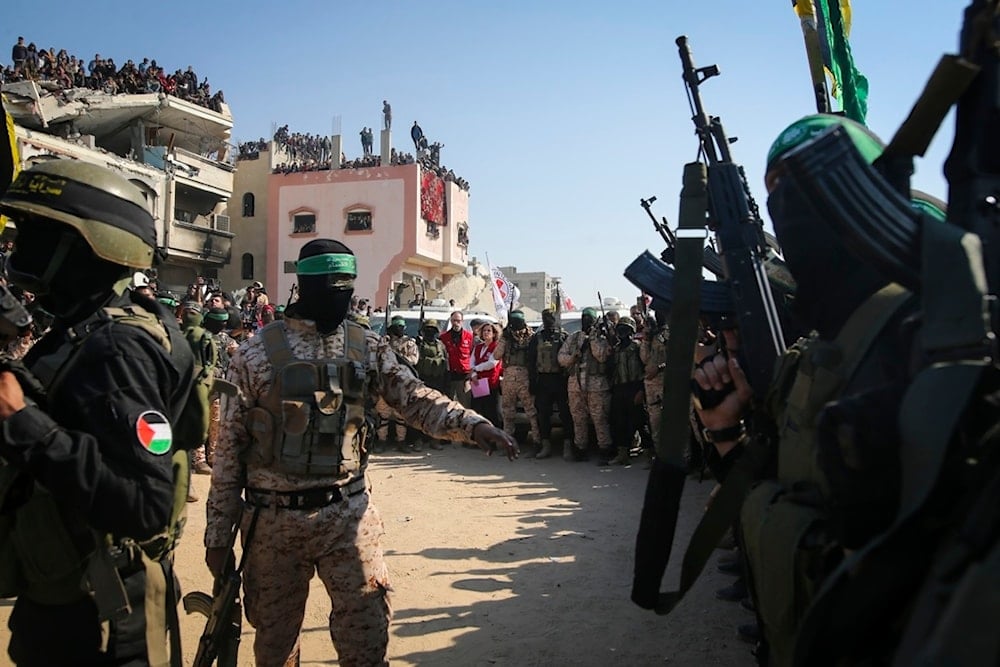Majority of captives in areas 'Israel' ordered to evacuate: Abu Obeida
Al-Qassam Brigades spokesperson Abu Obeida underlines that half of the captives held in Gaza are in areas the Israeli occupation ordered to have evacuated.
-

Hamas and Palestinian Islamic Jihad militants secure the area as Red Cross representatives wait for the handover of Thai and Israeli captives in Khan Younis, southern Gaza Strip, Thursday Jan. 30, 2025 (AP)
The spokesperson for the al-Qassam Brigades, Abu Obeida, announced Friday evening that "half of the living enemy captives are located in areas the Israeli army has ordered evacuated in recent days."
In statements posted to his Telegram channel, Abu Obeida said, "We have decided not to move these captives from these areas, keeping them under strict security measures that are extremely dangerous to their lives."
He added, "If the enemy is truly concerned about the lives of these captives, it must immediately enter negotiations to evacuate or release them. We have delivered the warning."
Abu Obeida placed full responsibility for the captives' lives on the Israeli government, stating, "The Netanyahu government bears complete responsibility for the lives of the captives. Had it truly cared about them, it would have honored the agreement signed in January — and most of them might have been home by now."
On Thursday, the Israeli military issued evacuation threats for Gaza City and surrounding areas, followed by a series of airstrikes targeting schools and Syrian refugee tents, killing and wounding dozens.
According to the Ministry of Health in Gaza, 86 people were killed and 287 injured in 24 hours.
'We saw death before our eyes'
The al-Qassam Brigades, the military wing of Hamas, released a video in late March featuring two Israeli prisoners held in Gaza. The footage, shared on the group's Telegram account, was titled: "Tell Them, Ohad!"
They insisted that Hamas had not coerced them into speaking, saying, "We want you to know that Hamas did not ask us to say this. This video clip is not intended for psychological warfare. We are the ones who asked and begged to be heard. Please hear our voices."
Describing their living conditions, they recounted, "Before the latest ceasefire deal on January 19, when the border crossings were closed throughout the war, there was almost no food. The situation was difficult and there was no safe place. Living conditions were difficult." However, after the ceasefire deal led to the reopening of crossings, they said Hamas fighters took care of them, providing food and improved living conditions.
“Just as the end approached, we were dealt a severe blow. On March 18, the Israeli government decided to attack Gaza from the air. That attack could have killed us," one captive said.
The two captives warned that the Israeli occupation's renewed military assault could lead to their deaths. "Know that an attack like the one that happened yesterday was the closest thing to my death and the death of those with me. We saw death before our eyes."
"Now, after the attack and the closure of the crossings, things have returned to the way they were. Food is running out, conditions have become difficult, and there is no safe place," one captive added.
'Israel' reneged on the ceasefire deal
The first phase of the ceasefire and prisoner swap, which lasted 42 days, ended in early March. However, the Israeli regime refused to proceed with the second phase and continued its military assault on Gaza, which has killed over 50,000 people since October 7, 2023.
According to Israeli estimates, 59 prisoners remain in Gaza, including 24 believed to be alive.
Previously, 40 released Israeli prisoners confirmed that continued military pressure on Gaza "kills the living prisoners and erases the remains of the dead."
Forty former Israeli captives in Gaza and 250 relatives of captives held in the Palestinian enclave have signed a letter urging Prime Minister Benjamin Netanyahu’s government to halt its renewed aggression and resume negotiations with Hamas to secure the release of the remaining 59 captives.

 4 Min Read
4 Min Read










